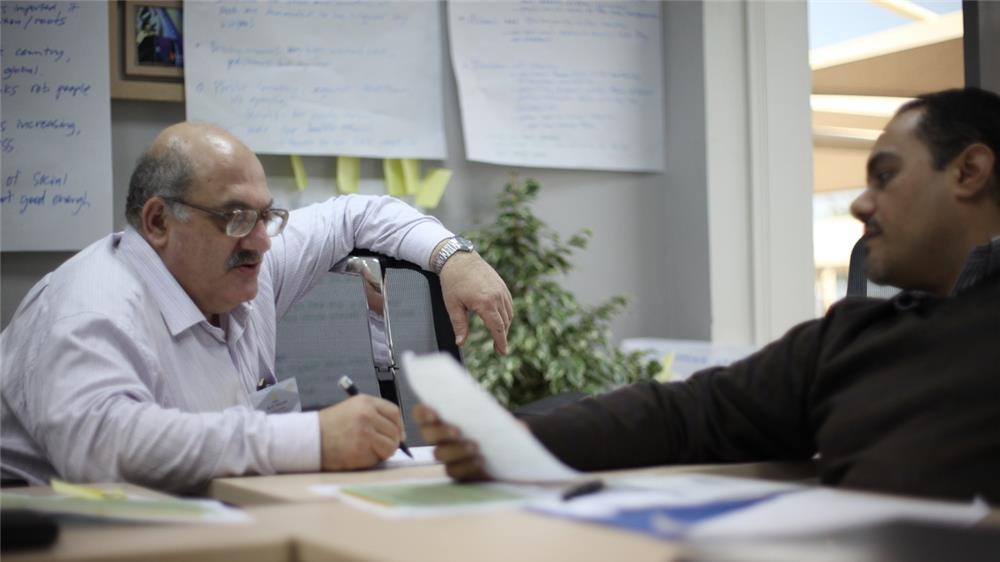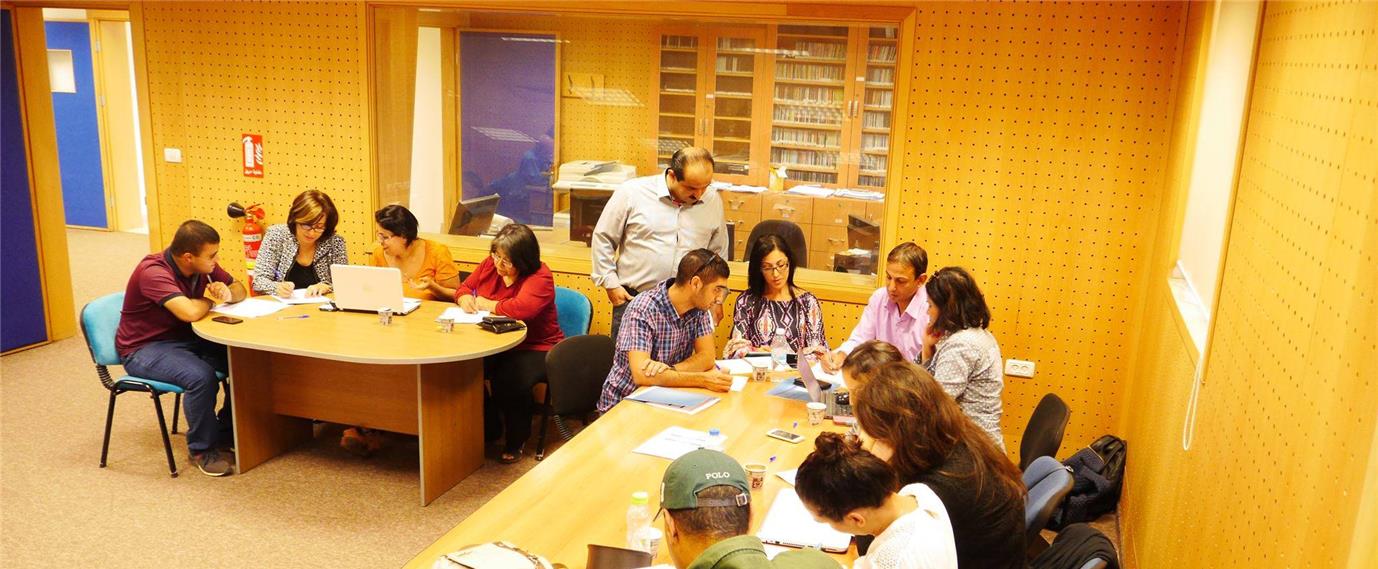قبل 23 عاما، حملت قلما أحمر للمرة الأولى، وبدأت أمرّره على أوراق بيضاء، عليها أخبار ومقالات وتقارير، لأتسقّط أخطاء المنضّدين وعيوب الصحفيين ومزالق الكتّاب المكرّسين.
كنا في الجامعة، وأمامنا ساعتان قبل أن تبدأ المحاضرة التالية. طلب مني صديقي أن أرافقه إلى جريدة تحت التأسيس طلبت موظفين في مختلف الحقول. تقدم يومها للعمل في قسم الكاريكاتير. عبّأ الطلب، وأرفق بعض رسوماته، وانتهى الأمر.
قبل أن نخرج، التفت إليّ وقال: عبّئ طلبًا. لن تخسر شيئًا.
سألت موظفًا هناك عن الوظائف المتاحة، فعدّدها وقال ضمن ما قال: "مدقق لغوي".
كان الوصف لطيفًا. عبأت الطلب، وقدّم لي الموظف قصاصة ورق، وقال إن فيها أخطاء، وعليّ أن أكتشفها.
مرّر القصاصة لرئيس التحرير، فاستدعاني، وقال: الليلة تتسلّم عملك مدققا لغويًّا تحت التدريب.
صرت مدقّقًا بالصدفة، ولم يستدعوا صاحبي. كان الحدث يشبه كاريكاتيرًا لم ينجح صاحبي في رسمه وتمريره ضمن طلب التوظيف.
23 عامًا وأنا جالس إلى المنضدة ذاتها. استبدلت "الكيبورد" بالقلم الأحمر. وما زلت أتسقّط الأخطاء.
صراع دائم
في قاعات التحرير، زاوية صغيرة يجلس فيها مدققون لغويون، يطلّون على قاعة فسيحة فيها محررون، يمرر هؤلاء لأولئك مواد المراسلين والكتاب، ليمرّوا عليها ويصححوا ما فيها من أخطاء، لتصير جاهزة للنشر.
وثمة صراع دائم بين الطرفين، كلٌّ يدعي وصلاً بالمنتج النهائي، وهو يتكئ على الطرفين معًا.
المحرّرون يرون أن للمعنى القدح المعلى. بينما يرى المدققون أن للغة قصب السبق. كان جدلاً بيزنطيًّا، ولم يكن يحسمه إلا قارئ فطن، يريد معنى عاليًا بلغة أنيقة، وبلا أخطاء.
كان الوعاء النهائي خليطًا من مكونات يجب أن تكون متناسقة، من معانٍ ينتظرها القراء، ومن بهارات لغوية تجعل الطعم لذيذًا، لا ملح زائدًا فيه.
كمدقق حديث العهد، كنت أدافع عن مهنتي بشراسة، وأجادل المحررين بلا تعب، إلى أن أدركت الخلطة الصحيحة:
الصورة الجميلة من المعاني، تحتاج إلى إطار مناسب من اللغة.
الوجه المليح يحتاج إلى ما يلائمه من "المكياج"، كي يبدو أخّاذًا.
المعنى واللغة، قطار يعرف وجهته، على سكة حديد لا عوج فيها ولا كسر.
لا علوّ لكعب المعنى على اللغة، ولا للغة على المعنى، هما صنوان في عالم الكتابة، يكمل أحدهما الآخر، وينقص أحدهما بغياب الآخر.
إن المدقق شرطي سير، يحافظ على مرور الكلمات بسهولة، محافظًا على المسافات بينها لئلا تصطدم، ولا يتدخل في هذه الحركة إلا بمقدار ما يمكن أن يمنع وقوع حادث، أو ليخالف سيارة ذرعت الشارع عكس السير.
أما المحرر، فمخطِّط المدن، يعدل الشوارع واتجاه السير، لتكون الحركة العامة طبيعية.
المدقق هو النحل الذي يجمع رحيق أزهار النصوص ويأتي به للملكة- المحرر، كي ينتج القفير أجود العسل.
المدقق هو الجندي في أرض المعركة، يتنقل بين جثث الكلام وألغام الكتّاب، ويقتحم بيوت الشعر ليعتقل علامات إعراب احتلتها عنوة، وطردت ساكنيها.
مهنة الرقابة على اللغة
لم تكن مهنة "التدقيق اللغوي" موجودة عندما كانت ألسنة الناس مضبوطة على إيقاع لا ينشز. ولعل الشعراء كانوا ضحايا لعسف اللغويين وذوي السليقة البكر، فعاب عليهم خصومهم والنقاد أي خطأ وقعوا فيه.
ولما اختلطت الأنساب، ودخل كثير من الأعاجم في مجتمعات لا تلحن، توترت اللغة، وتوترت المعاني، وبلغ الإسفاف فالانحطاط، الدرك الأسفل، فتنشط اللغويون وأصحاب القواعد.
وقد كانت دور النشر الوازنة تمتنع عن نشر حرف واحد دون أن يمرّ على لجنة للمحتوى، ثم على ضابط إيقاع اللغة.
كانت هذه الدور تحرص على اللغة، حرصها على المعاني التي تضمّها دفتا الكتاب الذي تصدره.
هل أقول إن محمود درويش، كان يمرر ما يكتبه على من يثق بلغتهم من خاصته؟ لم يكن يفعل ذلك لضعفه، لكنه لم يرد أن ينقل أحد عنه خطأ، وكان يدرك أن واحدنا قد لا يدرك خطأه، لأن وعيه منصبّ على المعنى أولاً وأخيرًا.
سأقول، وأجري على الله، إنه رغم كل الجهود التي كانت تبذل في هذا المجال، فإن معظم الكتب -وأتجنب قول "كل الكتب" خشية الشطط- فيها أخطاء عابرة، وإن اختلفت مستوياتها، وأتحدث عن أمهات الكتب هنا، ومنها دواوين كبار الشعراء.
الفعل البشري قاصر عن الكمال، على أن هذا لا يعني النكوص عن السعي إليه.
ما الذي يحتاجه من امتهنوا الكتابة كحرفة؟
أن يكونوا قادرين على كتابة فكرة ما، ولو عن طبخة شعبية، بشكل واضح وسليم، أو بالحد الأدنى من الأخطاء. وهذا ما نتوقعه ممن امتهنوا الكتابة كحرفة، في الصحافة أو الشعر أو الرواية أو القصة، أو حتى النص، ككائن فضائي لفظته صنوف الكتابة، واحتضنته منصات التواصل الاجتماعي.
اللغة عند هؤلاء هي ميزان الماء عند "البلّيط"، وهي المنشار عند "النجّار"، وهي الفرشاة عند "الدهّان". إنها الأداة التي لا يصلح أن يمارس أيٌّ كان مهنته دون التمكن منها.
ما حاجتي ببلّيط يعتمد على عينه، فيدمر أرضية البيت؟ وما حاجتي بنجّار ينشر خشب السرير بميل فاضح؟ وما حاجتي بدهّان يقف أمام الحائط ويعطي توصيفًا للجمال الذي يتوقع أن يكونه بعد أن يلطخه بسوء فعله؟
اللغة هنا ليست هامشًا.
وصف وظيفي
أن تكون مدققًا لغويًّا؛ يعني أن ترمي المثل القائل: "من راقب الناس مات همًّا" في أقرب حاوية، فمتعتك الأثيرة مراقبة الناس، وأن تنتصر لسيبويه على الخليل بن أحمد، وتقول لشاعر كبير فذّ، إن ضرورات الوزن لا تتيح له كسر كل القواعد، فثمة خطأ لا يمر، ولا تتيحه له الضرورات العبقرية، وأن تطلّ من شرفة لغتك على كتاب المقالات والمراسلين والمحررين في الصحيفة، وتبتسم بمكر، وتقول في سرّك: اكتبوا ما شئتم، فإن خراجكم آتٍ إليّ.
أن تكون مدققًا لغويًّا يعني ألا تستوعب كلمة من خطبة الجمعة، فقد استخدمت أصابع المصلين كلِّهم وأنت تعدّ أخطاء الخطيب الذي كان يتحدث عن الإعجاز اللغوي في القرآن.
مساوئ "التدقيق"
في "التدقيق اللغوي"، يتفلّت المعنى من بين يديك بينما أنت تتسقّط الأخطاء.
والعمل في التدقيق يجبرك على قراءة ما لا تهوى، فبينما أنت مع امرئ القيس في غزله بالحبلى والمرضِع، يقطع استمتاعك تدقيق كتاب عن فوائد الرضاعة الطبيعية. وبينما أنت منغمس في معارك جرير والفرزدق، يأتيك كتاب تدققه عن فن الصمت!
تتلبّسك في بدايات عملك حالة هوس بالأخطاء. وتبحث عنها بلا تعب؛ في ورقة الجريدة تحت الطعام، وفي لافتة محل الأحذية، وعلى ورقة إعلان على عمود كهرباء عن رجل مسنّ خرج ولم يعد. وقد حالت الأخطاء الهائلة دون أن تفكر بمد يد العون لهؤلاء.
ستذهب إلى الكتب العتيقة، وترتمي الأخطاء تحت عينيك دون جهد، فمن ديوان الشوقيات، إلى شرح ألفية ابن مالك، إلى الأعمال الكاملة لمحمود درويش.
مرة، اتصلت بي ناشرة دققت لها قصة، وقالت: "هل يمكن أن تأتي "المساء" منصوبة هنا: "في المساء، جاء الغريب مرة أخرى"؟ فقلت لها: كلا كلا. فقالت لي: هاك القصة التي دققتها: وردت هكذا. طلبت منها كل النسخ كي أصحّحها بيدي. أحسست بثقل المسؤولية عن أطفال سيرونها ويحفظونها، وسأتحمّل وزر تعطيل حرف يجرّ فيلاً، لا مجرد مساء سيعود فيه غريب ليسرق دجاجات السيدة العجوز ويهرب.
شهادة مزاولة مهنة
في عام 2015، قدم الإعلامي عارف حجاوي دورة في "الكفاءة النحوية وضبط النص"، في مركز تطوير الإعلام بجامعة بيرزيت الفلسطينية. وقد كررها عدة مرات، آخرها قبل شهر من الآن. وهي تشهد إقبالاً لافتًا. واللافت أيضًا شيء آخر.
لقد أعد حجاوي امتحانًا يقدمه من يشاء من المتدربين، يحصل من ينجح فيه على شهادة تقول إن حاملها مؤهل للعمل مدققًا لغويًّا.
حجاوي الذي أصدر أربعة كتب في النحو، استهدف فيها الإعلاميين، عمل مدققًا، وهو يمقت في هذه الوظيفة الرتابة، لكن ما صبّره عليها "لذة تسقّط أخطاء الآخرين، والهيبة التي يملكها من يملك صحة اللغة بإزاء من لا يملكها"، كما يقول.
ويقدم حجاوي، الذي عمل عقودًا في مؤسسات إعلامية كبرى، كالبي بي سي والجزيرة، مواصفات للمدقق اللغوي الجيد، فيقول إنه "من يملك سعة المعرفة لكي يرسم خطًّا واضحًا بين الخطأ الشائع الذي جعلته الألسن من الصحيح المقبول، وبين الخطأ الشائع المرذول، وسعة الخلق لكي يصحّح للناس أخطاءهم دون أن يفرك في أعينهم قرن فلفل. وأن يتحلى بصفة التواضع، الذي يساعد المدقق في معالجة نصوص ضعيفة المضمون بحسب رأيه. لكن تواضعه يجعله يحدث نفسه بأنه ربما كان للكاتب منطق آخر".

حدود التدخل
والمدقق اللغوي يناور في منطقة واضحة الحدود، فهو ضابط الإيقاع اللغوي والإملائي والمطبعي. أما الصياغة، فليست ضمن وصفه الوظيفي.
إلا أن المدقق اللغوي منذ عشرين عامًا إياد الرجوب، الذي عمل في صحف فلسطينية ورقية مختلفة، ونشرات إلكترونية، وفي تدقيق عشرات الكتب ورسائل الماجستير والدكتوراة؛ يرى أن حدوده أكبر.
يقول الرجوب: "أحيانًا، تصطدم بنصوص لا يعي أصحابها المفهوم الحقيقي للمدقق اللغوي، ويعتقدون بينهم وبين أنفسهم أنهم –من خلال صفّ الكلمات في السطور- قد أصبحوا كُتابًا أو ربما أدباء، ويلقون إليك بنصوصهم لتدقيقها، فتجد أنها عبارة عن فوضى تعبيرية لغوية وأدبية وحتى إملائية، فتضطر –احترامًا لذاتك- إلى الخروج من هذه الفوضى بنصٍّ يليق بك وبمكانتك أنت كمدقق لغوي، لتكون النتيجة نصًّا محترمًا ينشر باسم صاحبه على أنه كاتب أو أديب مرموق دون أي شكر أو حتى ذكر للمدقق اللغوي".
ويدين الرجوب لهذه المهنة بأنها "تخلق إنسانًا يقِظًا يلتفت لأمور دقيقة في العمل والحياة يمر عنها الآخرون مرور الكرام، مع أنها تكون أحيانًا مفصلية وحاسمة".
بين الانقراض والازدهار
الإعلامي حجاوي يرى أن مهنة المدقق اللغوي "ستزول عندما يزول الإعراب عن اللغة. وهذا سيحدث بعد عقود".
أما المدقق الرجوب، فيرى أن "الاهتمام بالتدقيق اللغوي قبل 20 عامًا كان أقل بكثير مما هو عليه الآن، فالمهنة في تقدم وزيادة اهتمام واحترام، لا في زوال".
أما محسوبكم، فأقف على الأعراف بين الرأيين، فإلى أن تزول بعد عقود، ستظل تحظى بالاحترام، وسأظل أعمل فيها، حزينًا على حال اللغة، سعيدًا بتسقّط الأخطاء، وفرحًا بالرزق الذي كان مكتوبًا ومقدرًا، وكنت أحتاج إلى صدفة فقط، قبل 23 عامًا، كي أصير مدققًا لغويًّا.








































